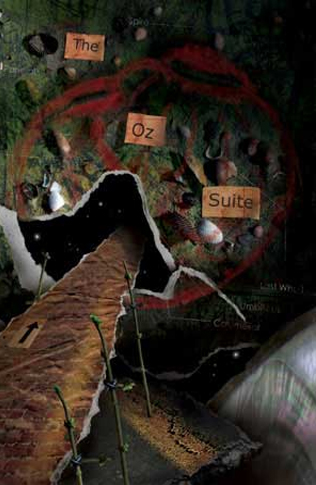
Gerard Houarner – The Oz Suite
Eibonvale Press, 2009, 145pp, £18 / £6.75, ISBN 978-0-9555268-3-1
“Themed around the Wizard of Oz in a very dark way,” the Reviews Editor said. “Fanfic,” I translated with a mental sigh. Sometimes I love to be wrong.
Gerard Houarner’s inspiration for this slim collection of three shortish stories is unashamedly the film, not any of the books. Love it or loathe it, The Wizard of Oz is crammed full of images that will be instantly recognised by most sentient beings in the western hemisphere. Some of those images, though it takes the subconscious mind to realise it, are very dark, just with a thin veil of brightly coloured paint over the top. It’s these that are the psychological reference points in the lives of three middle American protagonists, all damaged in different ways.
“No We Love No One” comes closest to standing on its own, sans Oz. One night the population of the earth essentially doubles as spiral, snail-like shells drift down from the sky on parachutes, each one containing a human baby. This is the only previously published story, and while it’s both eerie and a rebuke of our instinctive dislike of the unlike, that’s not a novel message and you get a feeling Houarner was twiddling his thumbs a little, trying to think of something to tie in that would really give it that little extra kick. Then he hit on the Wizard.
And it seemed to work, so he wrote the next two, this time with the Wizard link foremost in his mind. “Bring Me the Head of That Little Girl Dorothy” actually seems to make Oz a real setting at first, as the opening narrator seems to be the King of the Flying Monkeys. I say seems to. It’s possible ‘he’ is also the Witch herself, or a middle-aged woman in our own world on the edge after a lifetime of self-loathing and dysfunctional relationships, or maybe all of the above are simply self-aware fragments of a twisted personality that is somewhere.
Finally, “The Wizard Will See You Now” is about a badly abused child coming to terms with his demons. The Oz images here are the building blocks of an entire life, constructed with care and well depicted by the author: they have to be, because if he saw his world in real-world terms it would be too horrible to stay sane. The danger of wanting to see the Wizard is not knowing exactly what the Wizard might give you: but, see the Wizard you must. Eventually.
My favourite Oz story: to recruit the Munchkins, a nationwide casting call went out to differently sized aspiring actors. The 100-odd that answered congregated in Hollywood and for the first time in their lives met other people like them. After a lifetime of being solitary freaks back home, suddenly they were united, unionised and empowered.
Oz touches lives in many ways and some of them are even good.
